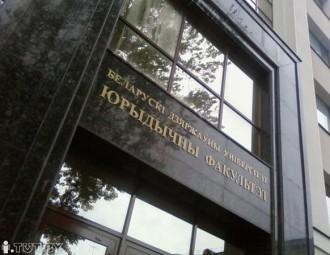Elena Tonkacheva: I hope that BSU is not training personnel for public prosecution only

The necessity to enhance the quality of juridical education obliges universities to cooperate with representatives from the whole spectrum of legal activity.
This opinion in the talk with the EuroBelarus Information Service shared Elena Tonkacheva, the head of the Legal Transformation Centre “Lawtrend”.
On April 8 it became known that to enhance the efficiency of procurator's supervision, the quality of education and scientific activities in the jurisprudence sphere law faculty of the Belarusan State University and prosecutor’s office of Minsk have signed an agreement about collaboration and coordinated action.
This cooperation is reported to be implemented by the advisory council, the sessions of which will be carried out if necessary but at least once in quarter. At the sessions of the advisory councils the events of the regional program “crime and corruption control in Minsk city”, as well as methodological recommendations about the realization of practical activity will be developed.
Law faculties are training tradesmen, not elite
Elena Tonkacheva noted that at the present time the quality of law education in our country leaves much to be desired. “For now law faculties have practically lost their ability to prepare elite personnel as it happens elsewhere in the world, - she said. – The learning process is rather tailored to train tradesmen – those who will serve certain interests”.
As the quality of legal training in our country leaves much to be desired, any actions aimed at the change and adaptation of the Belarusan legal education to the European standards of education should be welcomed, highlighted the expert. And the fact that the chief Belarusan university signs an agreement with the prosecutor’s office, not with the representatives from the Bar, human rights organizations, the Ministry of Justice and the Foreign Ministry is indeed surprising.
Elena Tonkacheva is sure that the efficiency of such inter-departmental cooperation would have been greater than in the case of cooperation with only one legal player. She doubts that the public prosecutor's office will manage to serve the interests of the university and cover every section of the legal sphere. Though, of course, it can help to develop learning techniques that are dealing with the problems of prosecutor's supervision.
The law can’t stand ad hoc interpretation
The experience of several European countries affirms the correctness of the choice to focus on different legal professions during the transformation period. “It goes without saying that under some transformation processes the majority of lawyers in public service turn out to be inept for the changes in the methods applied; i.e. the broader understanding of human rights questions, implementation of the international standards as well as the use of their own activity in practice”, - noted Elena Tonkacheva.
That is why, in compliance with the existing modern standards, advanced training and retraining of judges, specialists from the prosecutor’s office as well as other law officers is applied to the varied audience in the countries that are undergoing transformation processes. “The supremacy of law and justice can be applied to the representatives of any other profession. Some standards have to be understood universally, not specifically, by all representatives of legal profession”, - explained the expert.
And this is the reason why BSU should have demonstrated its pragmatic and broad approach by creating such advisory councils on interdepartmental and interdisciplinary basis.
“I hope that BSU is not training personnel for public prosecution only”, - summarized Elena Tonkacheva.
-
03.01
-
07.10
-
22.09
-
17.08
-
12.08
-
30.09



























